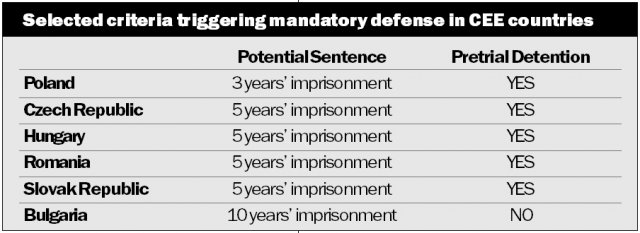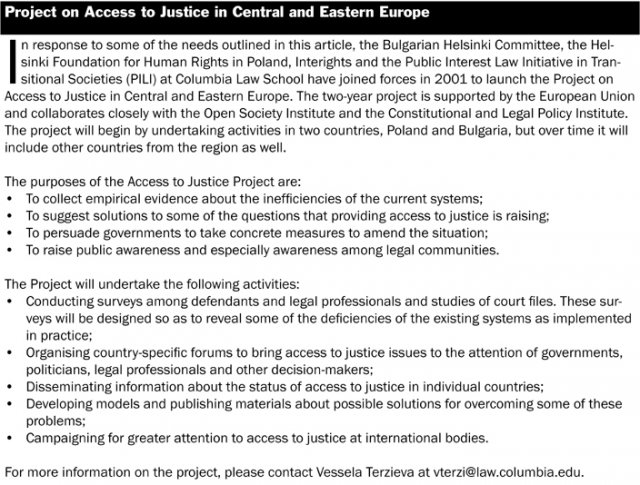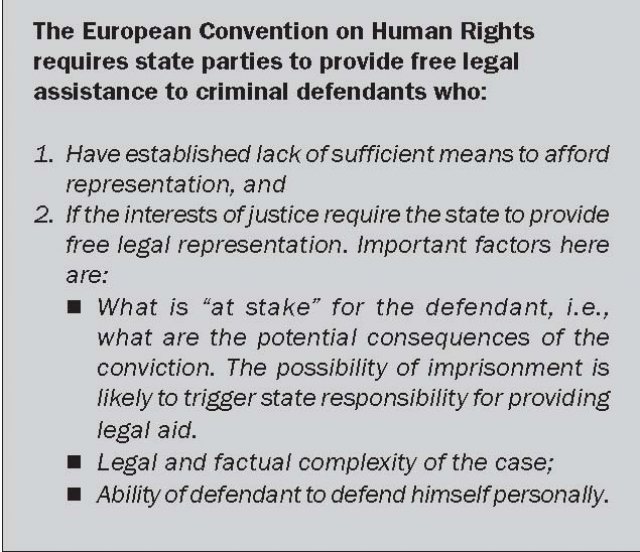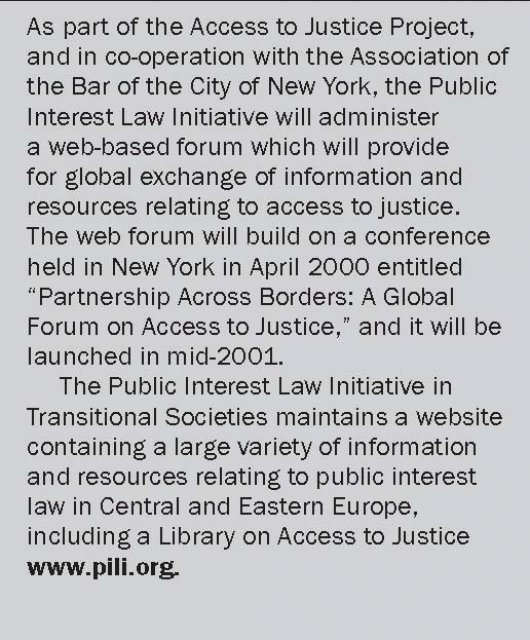Access to justice in Central and Eastern Europe: too little for too few
10 April 2001
Edwin Rekosh and Vessela Terzieva1
Does a legal system provide justice if as many as twenty to forty percent of the prison population did not have a lawyer to represent them when they were convicted? That is a question which today confronts many countries in Central and Eastern Europe. Prosecutors and judges may be consummate professionals, but is justice assured if criminal defendants go to prison without having a lawyer represent their interests and protect their rights? We think not.
Although the scope of the problem has received little recognition by the legal profession or the general public in Central and Eastern Europe, surveys conducted in 1999 in Bulgarian and Lithuanian prisons reveal that twenty (Lithuania) to forty (Bulgaria) percent of those convicted were not represented by a lawyer at trial.2 Furthermore, the Bulgarian survey reveals that a significant majority of those convicted without a lawyer are members of the main ethnic minorities in Bulgaria — Roma and Turks — even though the majority of the prisoners surveyed were ethnically Bulgarian. An especially disturbing finding of the Bulgarian survey is that most of the defendants who complained of police brutality during their detention were not represented by a lawyer during criminal proceedings.
Such surveys, while they are subject to fairly large margins of error, nevertheless illustrate some of the problems currently faced by the legal systems in Central and Eastern Europe. What does the notion of "fair trial" mean if a large number of defendants whose liberty is at stake are unable to participate at trial on an equal footing with the prosecution? What is the meaning of the rule of law if prohibitions against abuse are seemingly enforced only with respect to some citizens?
In general, the availability of a lawyer is closely tied to the financial circumstances of the defendant, despite the existence of procedural rules that guarantee free legal representation. But the Bulgarian survey reveals an additional troubling aspect: marginalised ethnic groups, such as Roma, are disproportionately affected. Although the legal framework for free legal assistance does not distinguish among defendants based on their ethnicity, the fact is that the proportion of Romani defendants convicted without a lawyer is significantly higher than the proportion of other defendants. Obviously, this is linked to the overall lower economic and social status of Roma as a whole, as compared to the general population.
States have an obligation to guarantee to everybody under their jurisdiction the right to free legal representation when the interests of justice so require. But as surveys have demonstrated, Central and East European states are not sufficiently meeting that obligation. Moreover, the states’ failure has a disproportionate, adverse impact on the Romani minority.
Access to justice in Central and Eastern Europe
Access to justice is an extremely broad notion. Impediments can be numerous, arguably including issues as diverse as high court costs, restrictive jurisdictional rules, overly complex regulations, ineffective enforcement mechanisms and corruption. Access to justice is also tied to more abstract problems such as judicial independence and legal literacy.
Few would contest the idea that the availability of a lawyers’ services is a crucial element of access to justice, especially when the state has marshalled its legal resources to accuse an individual of a crime, and the defendant risks losing his or her personal liberty if convicted. As discussed in more detail later in this article, international treaties recognize a right to legal representation in criminal cases for precisely this reason.
As a practical matter, however, whether defendants can hire a lawyer to defend them is closely linked to their socio-economic circumstances. Yet, in the legal systems of Central and Eastern Europe, there is no uniform rule recognising indigence or poverty alone as a ground for free legal assistance. Poland is an exception, however. The Polish code of criminal procedure requires the presiding judicial officer to appoint ex officio counsel if the defendant is indigent and has formally requested the services of a lawyer. In such a case, the defendant must prove the lack of sufficient means to the satisfaction of the judicial officer. Although Bulgaria has recently amended legislation and adopted the broadly discretionary language of the European Convention on Human Rights ("When the interests of justice so require"), it remains to be seen whether in practice these changes will bring legal aid to defendants in a similarly wide range of cases.

In general, legal systems of the region currently distinguish between mandatory and non-mandatory cases. In the former category, the proceeding authorities are under an obligation to appoint a lawyer to represent defendants, while in the latter category, they have discretion about whether or not to do so.
In mandatory defense cases, participation of counsel for the defendant is a condition sine qua non for the validity of the proceedings. A failure to appoint counsel in man-datory defence cases can result in a reversal of the conviction on appeal. Counsel who provide defence in mandatory cases are known as ex officio attorneys; that is, the law requires that they provide legal services by virtue of their position as a member of the bar.
The grounds for mandatory legal representation vary from country to country. The severity of the potential sentence, however, is one of the grounds recognised throughout the region. As to the length of the potential sentence that triggers mandatory defense, the laws also vary considerably. While in Poland a defendant accused of any crime punishable by a prison sentence of three years or more qualifies for mandatory defence, in Bulgaria a defendant is entitled to mandatory legal representation only if the crime alleged is punished by a minimum prison term of ten years. Thus, for example, a defendant convicted and sentenced to fourteen years in prison for a crime carrying a penalty of eight to fifteen years in prison might not qualify for mandatory defense. Such was the case of Mr P.D., from Bulgaria, who filed an application alleging a violation of his right to free legal assistance to the European Court of Human Rights with the assistance of the Bulgarian Helsinki Committee on October 8, 1999.3
Depending on the country, other criteria for determining whether legal representation is mandatory may include: whether the defendant is in pre-trial detention, the defendant’s mental or physical condition, age, ability to speak the official language used in court, or whether the trial is in absentia.4
When appointing an ex officio counsel in mandatory defense cases, the financial status of the defendant is irrelevant, at least in theory. It is necessary only that the case fall into one of the categories that triggers mandatory defense. In practice, it is mainly indigent defendants who rely on the ex officio lawyers, because those who can afford the attorney’s fees are likely to hire a lawyer of their choosing.
Ex officio counsel may also be appointed, at the discretion of the presiding judicial officer, in cases outside the conditions providing mandatory defense. The financial situation of the defendant is a prime consideration in such cases. However, the inherent discretion in these provisions and accompanying procedures provides no guarantee of representation for defendants. In the Czech Republic and Romania, for instance, defendants lacking representation are referred to local bar associations and the decision as to whether or not to appoint a lawyer as well as the procedures for appointment are left to the laws governing the legal profession. In other countries, such as Hungary and according to new provisions adopted recently in Bulgaria, indigent defendants whose cases do not qualify for mandatory defense may also ask for the appointment of a counsel ex officio, but the presiding judicial officer has full discretion as to whether to accede to the request.
The attorney’s fees in cases of mandatory defense or in the other cases involving ex officio counsel are generally covered by the country’s judicial budget. In countries where court budgets are perpetually inadequate, this can create a subtle but important disincentive in the exercise of judicial discretion when determining whether ex officio counsel is warranted. Moreover, in many countries, the appointment of ex officio counsel does not relieve convicted defendants from their ultimate obligation to pay attorneys’ fees. Rather, the obligation is merely postponed. If a defendant is found guilty, the state can enforce a claim for all costs and expenses incurred during trial, including the attorney’s fee for the ex officio lawyer.
In general, the legal systems in Central and Eastern Europe do not provide adequate access to legal defense for all citizens. Mandatory defense provisions are, for the most part, limited to relatively narrow categories of cases and do not address the needs of defendants who simply cannot afford to hire a lawyer. In most other cases, the decision to grant legal aid is left to the discretion of authorities who are often subject to financial disincentives for appointing ex officio counsel. Thus, for the vast majority of those who fall outside restrictive mandatory defense provisions, no right to legal assistance exists, even though they are at risk of losing their personal liberty.
Legal aid standards of the international human rights treaties
The right to legal assistance free of charge for indigent criminal defendants is one of the fundamental guarantees associated with the right to a fair trial embodied in international human rights treaties. The right to free legal assistance "where the interests of justice so require" is explicitly protected by Article 14(3)(d) of the International Covenant on Civil and Political Rights (ICCPR) and by Article 6(3)(c) of the European Convention on Human Rights.
In practical terms, the impact of international human rights treaties like the ICCPR on legislative reform in Central and Eastern Europe has been quite limited. This is partly due to the broader ambit of their provisions as well as the limited legal effect of bodies tasked with enforcing them. Regional treaties such as the European Convention on Human Rights (ECHR), on the other hand, have proven to be more effective instruments in shaping legislation in Central and Eastern Europe so as to comply with established human rights standards. Ratification of the Convention and compliance with its fundamental guarantees is a requirement for admission to the Council of Europe and an important criterion for accession to the European Union.
Article 6(3)(c) of the ECHR states that, among other rights, every person charged with a criminal offense has the minimum right, "if he has not sufficient means to pay for legal assistance, to be given it for free when the interests of justice so require." The European Court of Human Rights (ECHR), through its interpretation of this provision, has asserted that two conditions must be met for a state party’s obligation to provide free legal assistance to take effect: a financial requirement and a substantive law requirement.5

First, a state is under the obligation to provide free legal assistance to a person charged with a criminal offence only if that person lacks sufficient means to retain a lawyer independently. Neither the Convention nor the Court’s jurisprudence indicates a specific quantity of money defining what constitutes sufficient means. While the Court uses certain criteria to determine whether or not a person falls within this requirement, the burden of proof to demonstrate lack of sufficient means falls on the person charged with the offence. This burden, however, is lower than the standard of proof for criminal cases and may be met by a signed declaration of the person charged.6
Second, a state is required to provide free legal assistance to an accused person who lacks sufficient means to hire an attorney only if it is also necessary in the interests of justice. To determine whether the interests of justice invoke the state’s obligation, the European Court takes several factors into consideration: the complexity of the case as a matter of law and as a matter of fact, the public importance of the issue, the ability of the accused to understand the case, and the accused’s ability to defend himself in person.7 The Court also takes into account what is "at stake" for the defendant, specifically the severity of the potential sentence, as an independent factor that alone can trigger a state’s obligation to provide free legal assistance.8
In the case of Quaranta v. Switzerland (1991), for example, the applicant was subject to a maximum sentence of three years for drug trafficking. Even though he was sentenced to only 6 months for the crime, "free legal assistance should have been afforded by the mere fact that so much was at stake".9 Moreover, in Benham v. UK (1996),10 the European Court held that "where deprivation of liberty is at stake the interests of justice in principle call for legal representation".11 In that particular case, the applicant was subject to a deprivation of liberty of up to three months for tax law violations. This principle was confirmed in Perks and others v. UK (1999).12
Though nearly all of the countries of Central and Eastern Europe have ratified the European Convention on Human Rights, it seems that most of these states have failed to implement the provisions of the Convention regarding access to justice in their domestic legislation. While the case law of the European Court requires every indigent defendant to be given free legal aid if he/she faces imprisonment, most domestic legal systems in the region require free legal representation only to certain narrow categories of defendants or to those facing relatively long prison terms. Aside from those limited circumstances, the state’s obligations as set out in the European Convention on Human Rights are left to the discretion of the proceeding authorities, without any legal guarantees for the rights of defendants.
Access to justice and international standards on discrimination
In June 2000, the European Union adopted Directive No. 2000/43/EC with the purpose of putting into effect the principle of equal treatment in the member states of the European Union. The Directive requires all member states to amend their legislation so as to comply with its provisions. The Directive is also part of the acquis communitaire of the European Union, the body of law and jurisprudence with which applicant countries must harmonise their legislation.
 The EU Directive prohibits direct and indirect discrimination. According to Article 1, paragraph 2(b) of the Directive, indirect discrimination occurs "where an apparently neutral provision, criterion or practice would put persons of a racial or ethnic origin at a particular disadvantage compared with other persons, unless that provision, criterion or practice is objectively justified by a legitimate aim and the means of achieving that aim are appropriate and necessary".13
The EU Directive prohibits direct and indirect discrimination. According to Article 1, paragraph 2(b) of the Directive, indirect discrimination occurs "where an apparently neutral provision, criterion or practice would put persons of a racial or ethnic origin at a particular disadvantage compared with other persons, unless that provision, criterion or practice is objectively justified by a legitimate aim and the means of achieving that aim are appropriate and necessary".13
The International Convention for Elimination of All Forms of Racial Discrimination, a treaty adopted within the UN system, also prohibits apparently neutral laws that affect disproportionately and adversely one racial or ethnic minority group. Article 2, paragraph 1, point(c) of the Race Convention requires the states parties to take effective measures to review, amend or nullify laws and polices "which have the effect of creating or perpetuating racial discrimination wherever it exists."
Likewise, Article 14 of the European Convention on Human Rights prohibits discrimination "in the enjoyment of the rights and freedoms set forth in this convention." In a number of cases interpreting different articles of the Convention, the European Court of Human Rights has established that "the Convention is intended to guarantee not rights that are theoretical and illusory, but rights that are practical and effective".14 It would be difficult to sustain an argument that effective protection against discrimination does not include discrimination in fact, even resulting from neutral laws, if it has a substantial and consistent adverse impact on protected groups, such as racial and ethnic minorities. Even without the additional clarity provided by EU Directive No. 2000/43/EC, effective protection against discrimination implies protection against both direct and indirect discrimination.15
In 1999, the Bulgarian Helsinki Committee conducted a survey among 1000 accused and convicted persons detained in prisons in Bulgaria. The purpose of this survey was to determine the rough percentage of defendants convicted without a lawyer and to collect other information about the deficiencies of the current system. The results of the survey reveal that 64% of Romani defendants had no lawyer during the preliminary investigation, while the corresponding figure for ethnic Bulgarians was 48%. Similarly, during the trial procedure, 48% of Romani defendants had no lawyer, which was true for only 35% of the Bulgarians. Although there is little statistical information about the impact on racial and ethnic minorities stemming from the deficiencies in the legal aid systems in Central and Eastern European countries, informal inquiries among lawyers indicate that the situation in other countries of the region may be quite similar.
This data suggests that although Bulgarian legal provisions relating to legal aid are neutral on their face, they might have been applied in a discriminatory manner. Furthermore, the extent to which free legal assistance is withheld from indigent defendants may have a disproportionate, adverse impact on the Romani minority. Additional analysis and data collection should be undertaken.
 Bringing about reform of the legal aid systems in Central and Eastern Europe
Bringing about reform of the legal aid systems in Central and Eastern Europe
The current laws and practices in the region fail to guarantee access to justice for indigent criminal defendants, disproportionately affecting the Roma. Justice Ministries, legal professionals and the public must press for reforms to ensure that defendants enjoy their right to free legal assistance. Laws should be revised to clarify the standards for appointing ex officio counsel so as to guarantee compliance with international fair trial standards, and NGOs and governments should co-operate in devising new, more workable systems for managing the provision of legal aid.
One of the obstacles to reform is the lack of sufficient data about the current situation. Countries in the region collect no official statistical information about the number of people who are convicted without a lawyer, how this is related to their ethnicity, the financial costs involved, other consequences of the lack of counsel, etc. The lack of data makes it difficult to determine the real dimensions of the access to justice problem, to evaluate future needs and to determine how best to improve the efficiency of the administration of justice. Statistical information is crucial in order to make an objective assessment of the costs of the legal aid reform and in order to plan best how the systems for provision of legal aid should be organised. Any reform strategy will have to begin with the systematic collection of data.
Another obstacle is the lack of a public awareness about the problem of access to justice. As a result, there is little public pressure for reform, and the state’s scarce resources are diverted to other purposes. Without challenges of the states’ failure to secure access to justice to indigent defendants threatened with a loss of personal liberty, without social pressure and the support of the legal communities, improvement of the situation will be difficult to achieve. The deficiencies of the current legal aid schemes are similar in most of the countries in the region. It is incumbent on NGOs concerned with human rights and social justice to help build public awareness about these deficiencies, and to do so as part of a common, regional agenda so as to maximise their impact.
Currently, the laws in place in Central and Eastern Europe do not provide adequate guarantees for the right to free legal assistance, thus violating the fair trial standards of international human rights treaties. Furthermore, additional investigation is warranted to determine whether the administration of legal aid may be directly or indirectly discriminatory.
Up until now, there has been little attention paid to these issues. But a concerted effort by those who are concerned with protecting human rights and achieving better access to justice for all could make a difference. Despite the obstacles, legal aid reform is sorely needed.
Endnotes:
- Edwin Rekosh and Vessela Terzieva are the Executive Director and Associate Legal Officer, respectively, of the Public Interest Law Initiative in Transitional Societies (PILI) at Columbia Law School. PILI’s mission is to support human rights principles through assisting the development of public interest law communities in Central and Eastern Europe, Russia and Central Asia.
- The Bulgarian survey is conducted by the Bulgarian Helsinki Committee and is available at http://www.pili.org/library/access/bhc_survey.html.
- For more information on the case of Mr P.D., see Krassimir Kanev’s article “Roma and Access to Justice in Bulgaria” in this issue of Roma Rights on p.46.
- K. Bard and V. Terzieva, Legal Services for Indigent Criminal Defendants in Central and Eastern Europe, 5 Parker School Journal of Eastern European Law. 209 (1998).
- Quaranta v. Switzerland, Decision of 23 April 1991, Series A, No 205.
- Pakelli v. FRG, Decision of 25 April 1983, Series A, No 64.
- Quaranta v. Switzerland, see above.
- Id., see also Benham v. UK, Decision of 10 June 1996, Reports 1996-III.
- Quaranta v. Switzerland, see above, paragraph 33 in fine.
- Benham v. UK, Decision of 10 June 1996, Reports 1996-III.
- Id., paragraph 61.
- Perks and others v. UK, Decision of 12 October 1999, not published (available on the Internet at http://hudoc.echr.coe.int).
- Council Directive 2000/43/EC Implementing the Principle of Equal Treatment Between Persons Irrespective of Racial or Ethnic Origin. See http://www.pili.org/library/discrimination/eu_directive.htm.
- Airey v. Ireland, Decision of 11 September 1979, Series A No 32 (79); see also Belgian Linguistic Case, Series A No 6 (68) Marckx v. Belgian Series A No 32 (1979), Imbiroscia v. Switzerland, Series A, No 275.
- In one of the few cases of the European Court discussing the question of indirect discrimination, the Abdulaziz case (Abdulaziz, Cabales and Balkandali v. UK, A 94 (1985)) the Court found no violation of Article 14 on grounds of race. The issue there were immigration laws that although on their face were neutral, had the effect of restricting the right to enter the UK territory of people from Pakistan in a higher extent than immigrants from other countries. In Abdulzaziz at stake was the state’s interest to regulate its immigration policy, an interest to which the international tribunals usually are very deferential and would rarely interfere. Abdulaziz should be interpreted narrowly; its finding does not preclude future challenges of indirect discrimination before the European Court.




